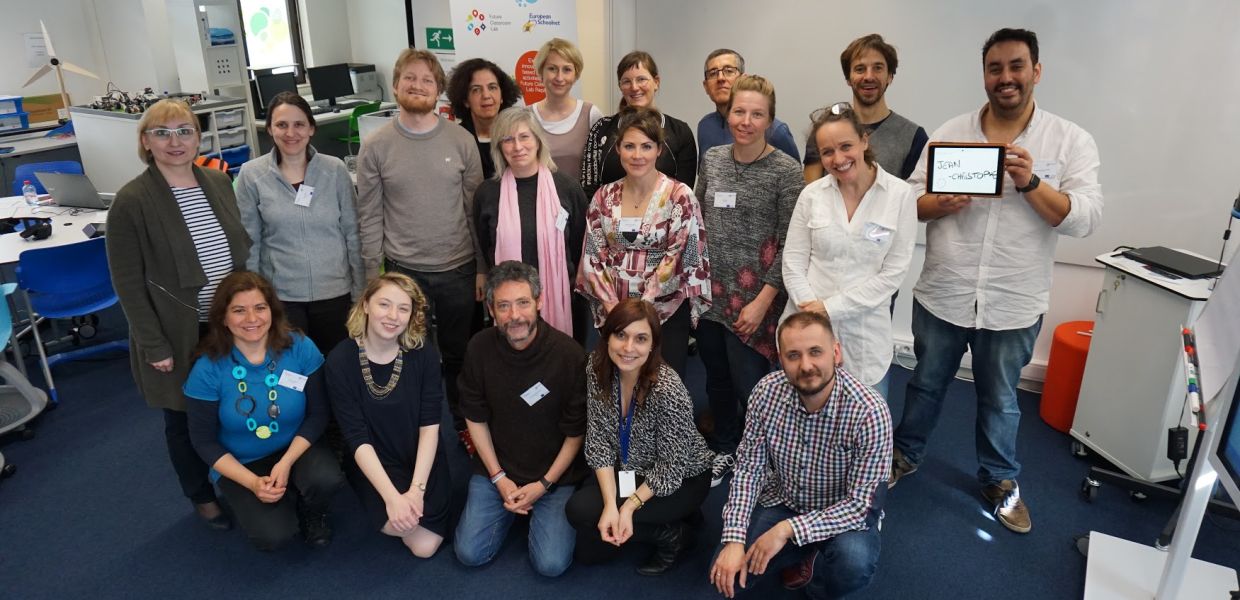Mainstreaming the use of digital cultural heritage in education
Meet the champions mainstreaming the use of digital cultural heritage in education: the Europeana Teacher Developer Group.

- Title:
- The Europeana Teacher Developer Group
- Copyright:
- CC BY
Over the last eight months, the Europeana Teacher Developer Group, coordinated by the European Schoolnet (EUN), have been designing learning scenarios with digital culture, testing them in their classrooms and helping to build the first Europeana MOOC. The group activities are coming to an end, but their work will have an impact on many students and educators across Europe and beyond.
The Europeana Teacher Developer group was set up at the beginning of the DSI-3 project (September 2017) with the aim to help mainstream the use of digital cultural heritage in the classroom and build a community of Europeana educators. The group consists of 18 primary and secondary teachers from Finland, France, Italy, Poland, Portugal and Spain. Meet our teachers and know what they think about cultural heritage.
Cultural Heritage in Education as European teachers see it. EUN Academy. CC-BY
The main task of the group has been to produce a set of learning scenarios (LS) using Europeana content and resources (along a series of workshops done in Brussels; October and December 2017 and April 2018). They are available for other teachers to use in the directory of EUN’s Future Classroom Lab.
The scenarios have been tested and implemented by each teacher among their students and they cover a range of disciplines and curriculum topics in primary and secondary education, such as STEM (science, technology, engineering, and mathematics) and also art and languages. New trends and pedagogical methods, like project-based learning or inquiry-based learning, have also been applied with the goal of fostering uniquely 21st century skills: collaboration and teamwork, digital literacy, problem-solving and critical thinking.
A good example of developing all these skills is ‘The Story of Darwin and the Comet Orchid’ scenario, as explained by the teacher Matteo Catadori.
Learning Scenario Implementation - Matteo Cattadori. EUN Academy. CC-BY
While implementing the scenarios, the teachers had the opportunity to reflect on their own practices thanks to the assessment made by their peers (the Europeana Teacher User Group, which we’ll hear more about soon) and, most importantly, by their pupils.
Gwendoline Juilleron, a French History and Geography teacher, made a video showing her students’ impressions of the ‘Christianity in the Middle Ages’ scenario.
Student interviews Gwendoline Juilleron. EUN Academy. CC-BY
Student testimonials clearly show that working with digital culture and IT technologies make the lessons more playful. Further, they show that using primary sources and historical documents is especially engaging, and that accessing complementary content from other countries via Europeana is helping them to enrich, and finish their assignment quicker.
The LS, the videos and other pedagogical materials are now integrated in ‘Europeana in your classroom: building 21st-century competences with digital cultural heritage' MOOC’. This massive open online course offers professional development and training to other teachers in the use of digital culture regardless of the subject they teach.
Its first edition has run between 30 April and 15 June and has registered more than 1,900 participants so far. Thanks to the those finishing the MOOC, we expect to benefit 16,000 students across Europe, giving them digital access to our cultural heritage and fostering the skills they need for personal development and employability.
The work of the Developer Group will remain and grow in the coming years. It will improve other teachers’ competencies and those of their students, but also lays the foundations for our future Ambassadors Group.
Do you want to know more about next steps and how to get involved in our Europeana Education community? Get in touch with us ([email protected]) and join our LinkedIn Group!

